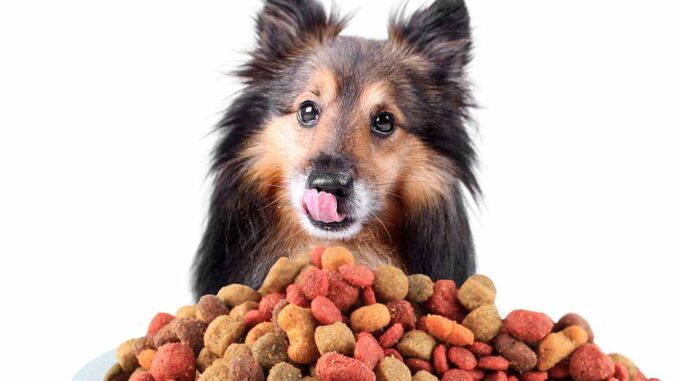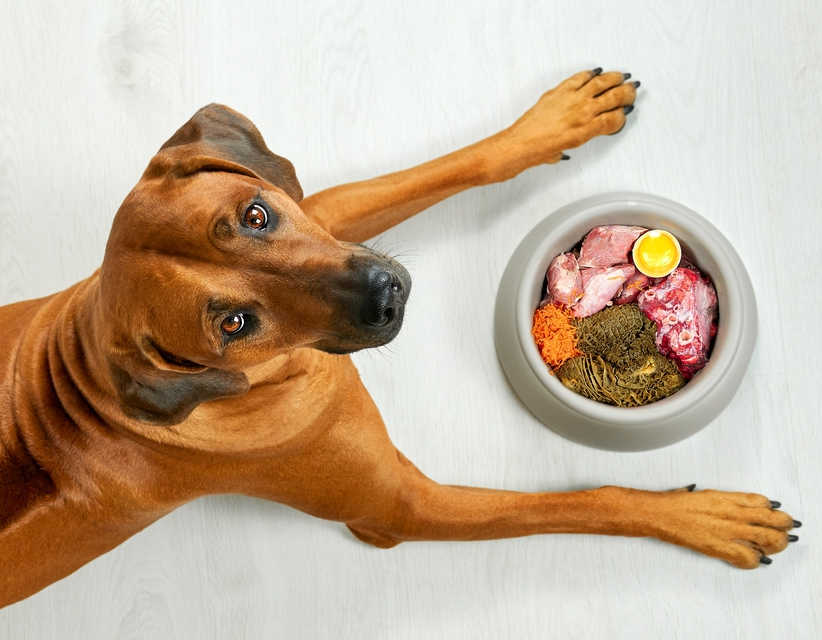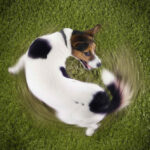
This article was updated on January 2nd, 2023
Pet parents of epileptic dogs report success in reducing the number or severity of seizures with dietary management and nutritional supplements (Source). In this article, we’ll look at some research regarding the effect of diet and dietary supplements on seizures in dogs. Our discussion will include:
- foods you shouldn’t feed to a dog that has seizures and
- the best commercial and homemade foods for epileptic dogs.
We’ll also discuss dietary supplements that may help dogs with seizures and whether food allergies can trigger seizures.
Can food help dogs with seizures?
Some dogs are considered drug-resistant, so anti-epileptic drugs don’t achieve the desired level of seizure control. Fortunately, there is some evidence that dietary therapy may help manage the frequency and severity of seizures.
Several studies suggest that dietary management and supplementation can help support the effectiveness of anti-epileptic medications in dogs. For example:
- A 2015 study of a medium-chain triglyceride (MCT)-rich ketogenic diet fed to 21 dogs yielded promising results. Dogs showed a significantly lower frequency of seizures on the diet.
- Another study published in 2020 evaluated the effectiveness of MCT oil supplementation to reduce seizures. 28 dogs participated in a 6-month randomized trial. Results suggest that dietary supplementation with MCTs can help manage seizures in dogs.
- In a 2009 case study involving a Great Dane with epilepsy, clinicians reported that the frequency of seizures fell by 85% after 50 days of supplementation with omega fatty acids. Results were tracked for the next 18 months.
What should I feed a dog that has seizures?
Seizures are usually idiopathic, but some have a nutrition component. Because of this, choose food with high-quality ingredients and no artificial additives. Select products with:
- Natural ingredients
- High levels of quality animal proteins to support brain function
- Animal fats to provide essential fatty acids for proper neurologic function
- Omega fatty acids
- B vitamins
The best commercial foods for dogs with seizures
The key to finding commercial dog food is to look for a product that:
- Is high in quality proteins
- Contains moderate levels of fat from animal sources
- Has no artificial ingredients
- Is low in complex carbohydrates
- Uses natural ingredients
Below are three of the best commercial foods you can feed your dog with seizures. If none of these formulas suit your pooch, use the guidelines above to select something that fits his needs.
Ketona salmon recipe adult dry dog food
With 46% protein from salmon and less than 5% carbs, this ketogenic food from Ketona contains natural ingredients. It’s free of grains and other complex carbohydrates and has no artificial additives. A balanced blend of vitamins and minerals helps to ensure proper nutrition for your pooch. The moderate (16%) fat content comes from salmon fat, which provides a rich source of omega fatty acids to support brain health.
Origen original recipe for dog food
Origen original is a grain-free food with 38% protein sourced from whole meat ingredients. A blend of turkey, chicken, eggs, and fish ensures your pooch will get the essential amino acids his brain and body need for normal functioning. Omega fatty acids from flaxseed and fish support brain health. With 18% fat from animal sources, this food also provides your pal with key fatty acids for the neurons. It’s grain-free and contains natural ingredients.
Stella & Chewy’s wild wed raw blend kibble dry dog food
Featuring beef and pork as the top two ingredients, this food from Stella & Chewy’s has 36% protein and 15% fat from animal sources. It’s free of artificial ingredients and complex carbohydrates that might trigger seizures. Animal fats and salmon oil provide your pooch with omega and essential fatty acids that fuel the brain and support normal functioning.
The best homemade foods for dogs with seizures

Some owners believe feeding a homemade diet to their dog can help with seizure control. If you choose to make your pup’s dog food at home, the recipe should include:
- Muscle meat and organ meat, including beef, chicken, and salmon
- Animal fat
- Gelatin from grass-fed animal sources
- Cooked or pureed whole vegetables, including green beans and potatoes
- A moist carrier like applesauce for multivitamin supplements
- Multivitamin supplement
- Omega fatty acids
- MCT oil
Homemade dog food allows you to tailor the recipe to your pup’s needs. If he’s sensitive to certain foods or has triggers, you can avoid them and substitute other ingredients. Additionally, with homemade food, you can control how much fat, carbs, and protein are in the recipe.
There are also some risks associated with homemade food. Without a clear recipe, you may miss some of the essential nutrients for your dog. When feeding a raw food diet, you could introduce pathogens to your dog. Follow instructions and recipes when preparing a homemade diet to minimize the risks.
What are some natural supplements that help control epilepsy/seizures?
Some supplements that may help to control epilepsy and seizures in dogs include:
- MCT oil
- Omega fatty acids
- B-complex vitamins help with brain function
- Gelatin contains glycerin, which helps protect the brain
What foods should not be fed to a dog that has seizures?
Certain ingredients may trigger seizures in some dogs. Therefore, they should not be fed foods that contain:
- High levels of salt, particularly if your pooch is on potassium bromide
- Artificial flavors, colors, or preservatives
- BHT, BHA, or ethoxyquin
- Gluten
- Complex carbohydrates
- Casein
- Dairy products
- Corn
- Soy products
Can food or allergies to food cause seizures in dogs?
Yes, some foods can trigger seizures in some dogs. Allergic reactions to food ingredients can trigger an episode. Toxins are another substance that may cause seizures. Foods to avoid include:
- Foods already listed above
- Glutamate
- Xylitol
- Chocolate
- Grapes and raisins
- Onions and garlic
- Raw potatoes
- Excess salt
- Alcohol
Frequently Asked Questions
Does a ketogenic diet help reduce seizure activity in dogs?
Recent clinical studies suggest that a ketogenic diet may help reduce seizure activity in dogs. One study followed 21 dogs over 6 months and found an average 13% reduction in epileptic events across the group. Learn more.
Do raw diets help dogs with seizures?
Raw diets may help dogs with seizures because they rarely contain harmful substances or additives that could trigger an episode. The most effective raw diet will be high in quality proteins and moderate in animal-based fats. Pet parents of epileptic dogs have also reported success in reducing the number or severity of seizures with dietary management and nutritional supplements (Source). In this article, we explain the positive effect of diet and dietary supplements on seizures in dogs:
Is a grain-free diet important for dogs with seizures?
Grains can be a trigger for seizures in epileptic dogs. Therefore, it’s important to choose grain-free options for your pup if he struggles with seizures. Read our article: Can Food Cause Seizures in Dogs? A Vet Explains.
How long does it take a dog to recover after a seizure?
The recovery period varies widely and partially depends on the type and severity of the seizure. It usually takes anywhere from a few minutes to a day for a dog to recover.
What else can I do to prevent full seizure episodes?
To prevent seizures in your dog:
- Work closely with your veterinarian to monitor your dog and ensure medication is effective
- Remove identified triggers from the home if possible
- If flashing lights are a problem, secure your dog in a shaded area during thunderstorms
- Keep the environment calm and peaceful
Should you put a dog that has seizures down?
If your dog has an occasional seizure, there’s no need to consider putting him down. However, when a dog has multiple seizures and doesn’t respond well to treatment with anti-epileptic drugs, you should discuss euthanasia with your veterinarian. Repeated seizures or prolonged seizures can cause significant brain damage and impact your pup’s quality of life. Learn more: Dog Seizures: When to Put Your Dog Down.
Learn more about seizures in dogs on Senior Tail Waggers:
 Can Seizures Kill Dogs? Dr. Guise Explains - Many dogs that have seizures enjoy long, normal lives with nominal side effects, but not… [...]
Can Seizures Kill Dogs? Dr. Guise Explains - Many dogs that have seizures enjoy long, normal lives with nominal side effects, but not… [...] Causes and Signs of Psychomotor Seizures in Dogs - A colleague of mine recently shared an intriguing case with me. The owners were concerned… [...]
Causes and Signs of Psychomotor Seizures in Dogs - A colleague of mine recently shared an intriguing case with me. The owners were concerned… [...] Can Food Cause Seizures in Dogs? A Vet Explains - Seizures happen when normal brain functions are disrupted. We often don’t know what causes a… [...]
Can Food Cause Seizures in Dogs? A Vet Explains - Seizures happen when normal brain functions are disrupted. We often don’t know what causes a… [...] Focal Seizures in Dogs: A Vet’s Guide for Dog Owners - “Doc, I think my dog is hallucinating,” began the call of one of my clients… [...]
Focal Seizures in Dogs: A Vet’s Guide for Dog Owners - “Doc, I think my dog is hallucinating,” began the call of one of my clients… [...] A Dog Owner’s Guide to Grand Mal Seizures in Dogs - In this article, we’ll explain grand mal seizures, discuss the symptoms, and describe how you… [...]
A Dog Owner’s Guide to Grand Mal Seizures in Dogs - In this article, we’ll explain grand mal seizures, discuss the symptoms, and describe how you… [...] Old Dog Seizures: Our Veterinarians Explain What to Do - A variety of medical conditions can cause older dogs to experience sudden seizures seemingly out… [...]
Old Dog Seizures: Our Veterinarians Explain What to Do - A variety of medical conditions can cause older dogs to experience sudden seizures seemingly out… [...]Disclaimer: This website's content is not a substitute for veterinary care. Always consult with your veterinarian for healthcare decisions. Read More.


My dog is guessed to be a Chihuahua and Dixie mix, he is about 6 or 7 years old. We rescued him with no history when he was estimated to be around 3. His first seizure with us was about three months after we got him. After his third seizure he was diagnosed with epilepsy. He had lots of tests, the seizures were not frequent, many months apart. He was put on phenobarbital, 16.2 mg 2x a day. It’s pretty well controlled with that. The changes started when the vet said he was overweight and some of his lab results were too high. We switched him to a chicken mixture of Fresh Pets. That caused his seizures to increase quite a bit so the vet said take him off chicken. I’m now making home made and supplementing it with a canned all natural turkey food. I can’t find much on what kind of vegetables to put in his food. I use ground turkey, sweet potatoes, blueberries, pumpkin, green beans. He gets the canned to give him nutrients that I may not have in the homemade. Is there a good source for healthy homemade food recipes for epileptic dogs? Please help, thank you
Hey there Karen, my name is Dr Linda Simon and I’m a small animal vet with 11 years of clinical experience.
Thank you for your question.
When we are not feeding a commercial diet for the bulk of the diet, there is a big risk of our pets developing nutritional deficiencies. Some studies have shown over 70% of home made diets are not nutritionally complete, lacking ingredients like iodine, zinc and calcium.
So, whenever a client of mine is keen to make a home-made diet, I suggest they working alongside a qualified nutritionist, who can make an appropriate meal plan. They will take into account your dog’s medical history too.
As you are feeding some commercial food, this makes the risk of a deficiency less likely, which is great.
In general, when it comes to epilepsy, we want diets that are rich in omega 3 fatty acids. This can mean adding olive oil to their diet or feeding ingredients such as salmon, eggs or salmon oil. Brussel sprouts and cauliflower are good options if trying to increase omega 3s.
There is also some good research that a medium chain fatty acid supplement can be useful. Purina Proplan NeuroCare is a diet rich in MCFAs.
Coconut oil is a natural source of MCFAs.
Another consideration would be a hypoallergenic diet; in one study, 7 of 8 participants on this diet experienced less fits.